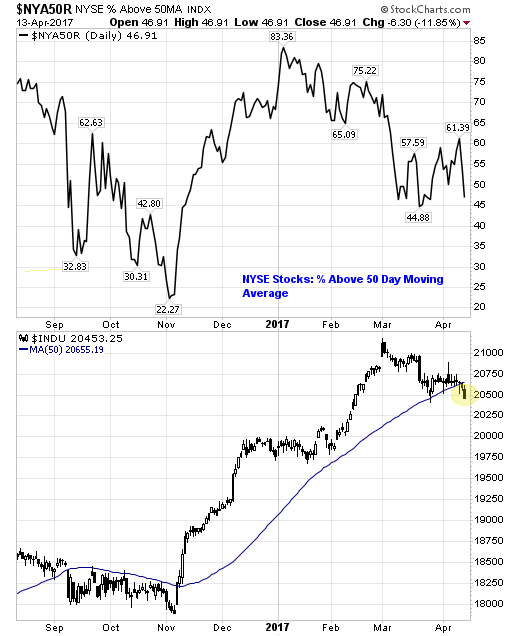Wall Street loses the spring in its step
Wall Street doesn’t have to worry about a meltdown today because, thankfully, the markets will be closed for the Easter holiday weekend. But equities sure were hit hard on Thursday, with a 139-point (0.7 percent) drop pushing the Dow Jones industrials index further from its 50-day moving average.
This is now the most significant downtrend for U.S. stocks since before Election Day.
It puts an end to a tight two-month trading range as the first-quarter earnings season kicks off (second chart below). Investors are growing increasingly concerned about President Donald Trump’s shift away from domestic priorities like tax reform and health care legislation to foreign policy, where the White House can exercise power more unilaterally.
The situation in Syria remains at a low boil, and the standoff with North Korea is heating up as the Trump administration puts pressure on China to get Pyongyang under control on fears the despotic nation is preparing another nuclear weapons test. And on Thursday President Trump dropped the “the “mother of all bombs” bomb on ISIS positions in Afghanistan.
Bank stocks were hit after JPMorgan (JPM), Wells Fargo (WFC), and Citigroup (C) reported results, reversing an initial surge on better-than-expected earnings and revenues. As investors dig into the results’ details, negatives like surging credit card charge-offs, lower mortgage originations and tighter net interest margins dampened spirits.
Wells Fargo fell 3.3 percent despite beating earnings estimates because the results were low quality, helped by provisions and taxes. Revenues missed on softer net interest margins. Mortgage applications fell by 23 percent quarter-over-quarter to just $59 billion, below the nadir hit in 2014 and back to financial crisis lows.
JPMorgan lost 1.2 percent in sympathy, setting up a possible test of its 200-day moving average, not touched since last summer. That would be a near 11 percent decline from here.
The bank reported earnings of $1.65 per share on revenues $25.6 billion vs. estimates of $1.51 and $24.6 billion, respectively. But average core loans increased 9 percent over last year, missing estimates for 10 percent growth and fueling concerns about slowing U.S. loan demand.
On the economic front, March producer prices fell 0.1 percent vs. the flat reading expected. On an annual basis, however, prices posted their largest increase since March 2012, up 2.3 percent.
Consumers keep beaming with confidence, as the April Michigan consumer sentiment index came in at 98 vs. the 96.5 expected and the 96.9 reported in March. The current conditions subindex hit its highest level since 2000 and nearly reached the all-time high set in 1999.
But looking ahead, stocks look vulnerable to continued further drops as the CBOE Volatility Index (VIX) -- Wall Street’s “fear gauge” -- hits preelection levels on the geopolitical turmoil.
And market breadth, or the share of stocks moving higher, continues to narrow in a clear warnings signal: The percentage of NYSE stocks above their 50-day moving average, a measure of medium-term trend, fell to just 47 percent on Thursday down from a high of more than 83 percent set in early January (first of the charts above).





